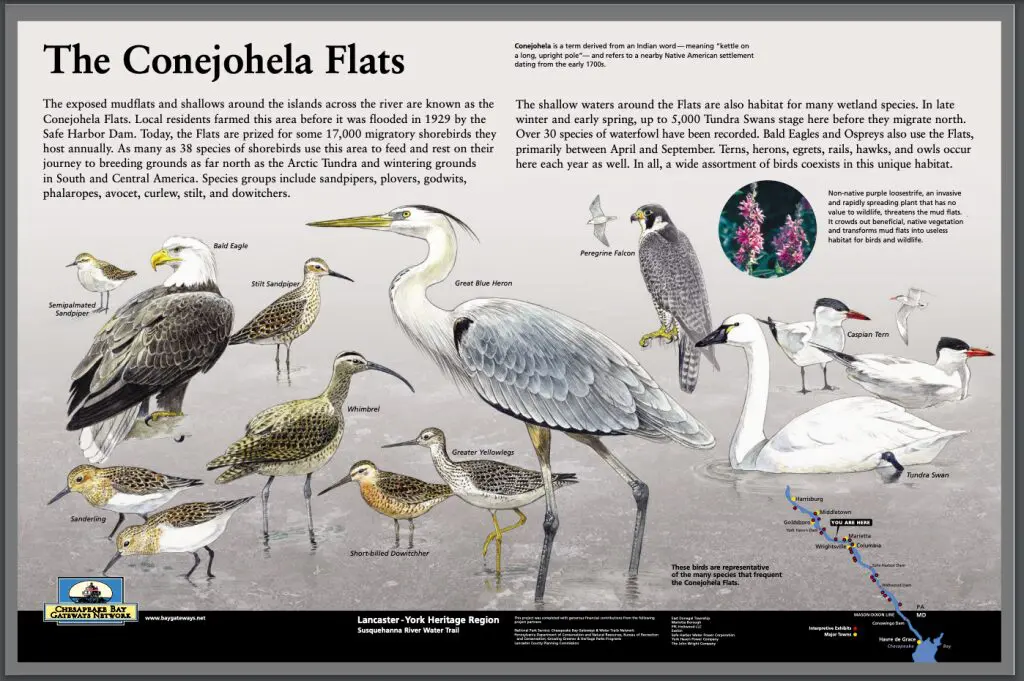Among the leaf litter, we discover plastic as numerous as it appeared on the banks from a distance. We find bottle caps, spent lighters, shreds of plastic bags, and Styrofoam bits everywhere. We see broken bits of plastic, no longer reminiscent of the items of their origin. They are just bits of colorful plastic among the leaves, roots, and soil. A bird can’t fit a discarded Gatorade bottle in its beak, but the tiny colored bits of plastic that permeate this island may well be enticing to many creatures. Think back to the shorebirds pecking into the mudflats or the osprey diving for fish. They snap at likely targets, as do fish. They do not have hands to pick up and examine that colorful object drifting past, so they must use their mouths. – Justin Mando, The Conejohela Flats, Part 3
Glad to see you back for the thrilling conclusion of The Conejohela Flats. Did you know that over 17,000 shorebirds of about 38 different species use the Flats to rest, relax, and refuel on their migratory journey to favorable breeding grounds as far north as the Arctic Tundra? Take a look at this nifty diagram from the Susquehanna National Heritage Area for more details.

Image courtesy of the Susquehanna National Heritage Area.
And now, back to our interview with Millersville English Professor Justin Mando, who is influencing the next wave of environmentalists by teaching them how to write to save the world (IMHO).
Justin, how do you see the fall of plastic and the rise of more sustainable products taking shape? I suspect the industry will not go along willingly, so what techniques do you employ to get manufacturers to the table when discussing replacing plastics with more sustainable materials?
As a person who studies and teaches rhetoric, I have hope in the power of raising our voices in favor of more sustainable products and against those that harm us. Organized efforts like those taken by an organization like LSRA [Lower Susquehanna Riverkeeper Association] through our microplastics monitoring program can demonstrate the problem and raise awareness so that enough people become fed up with how things are. Rachel Carson faced the same insurmountable odds when she was writing Silent Spring, and she got it done. She’s one of my great heroes.
I agree with you about Rachel Carson. I wonder where we would be if she hadn’t sounded the alarm. Things would be a lot worse, I think, without her guidance. So how do we keep her light shining, and where do we start with reducing our plastic consumption? Can Technology get us out of this mess, or do we need another solution? Perhaps a magic wand?
I can’t claim to be all that knowledgeable on the technological side of plastic production or disposal, but I do think that technological Innovation is a necessary part of the solution. We have to develop new materials that do not have the adverse effects on our world that plastics do. At the same time, plastics are so pervasive in our environment that the future will hopefully include some way to actually decompose plastic. I have read of progress being made in that direction, again, by using fungi.
But really, if I had that magic wand, I’d use it to help people see that they can live their lives with much less single-use plastic than they consume now. We can send a strong message and begin to make an impact just by cutting down our own use of these materials. It’s very tough to completely cut them out, but it isn’t all that hard to refuse quite a bit of plastic that eventually finds its way into our waterways.
Anything else? Feel free to dish.
Pam Lazos rocks. I feel so fortunate that she has become a board member of LSRA! Thank you for giving this attention to my work. I look forward to our collaboration on some exciting projects we’ve been developing.***
Well, the feeling is mutual. Thanks, Justin, for taking the time to create these videos and share your thoughts on a very important topic.
** Justin is referring to pestalotiopsis microspora, the plastic-eating mushroom that I have written about on this blog previously.
*** Justin had the idea to start a fun-raising project called Geotrashing which would operate much like geocaching, but the people going into the field to find “the cache” will actually be finding and removing plastic from the environment. We hope to make this idea a reality in the near future.
Speaking of the future, please join us at the LSRA office on February 19th, 2025 for our first Winter Speaker’s Series titled “Listening to the Susquehanna and Giving it Voice” featuring Justin Mando and Michael Garrigan. Justin will speak about connecting people to the Susquehanna through writing and advocacy, and our Pennsylvania Environmental Rights Amendment. Michael will share his place-based poetry, exploring the many ways we are shaped by the river. Some poems will come from Garrigan’s books River, Amen, and Robbing the Pillars. You can RSVP here.
Thanks for reading and hope to see you on the 19th!
pam lazos 2.11.25
Originally Published on https://greenlifebluewater.earth/feed/
Notifications